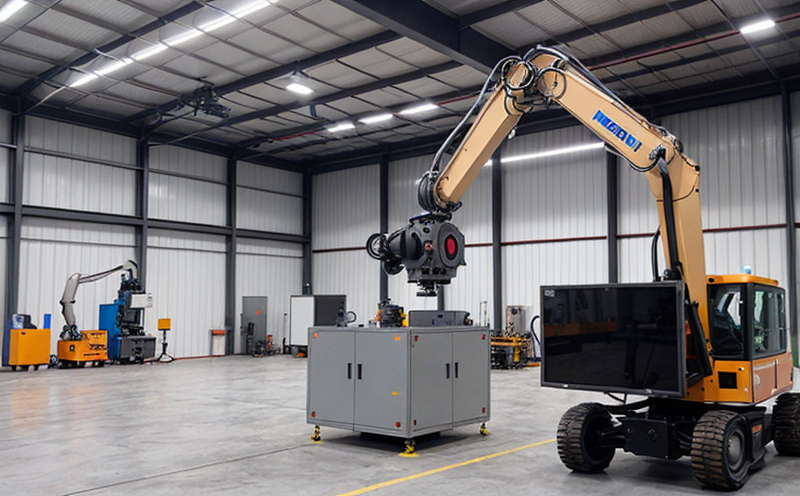ISO 22166-1 Modularity in Industrial Robot Systems Evaluation
The ISO 22166 series is designed to provide standards that enhance the performance, reliability, and safety of industrial robots. Specifically, ISO 22166-1:2018 focuses on modularity within industrial robot systems. This standard addresses how modular components can be integrated into robotic systems without compromising overall performance or compliance with existing standards.
The concept of modularity is pivotal in modern manufacturing environments, where flexibility and adaptability are essential for meeting dynamic market demands. By ensuring that different modules—such as sensors, actuators, controllers, and communication interfaces—are designed to work seamlessly together, ISO 22166-1 helps manufacturers build robust industrial robots that can be easily upgraded or reconfigured.
The standard covers several key aspects of modular design:
- Component compatibility
- Interoperability between modules
- Ease of integration and upgrade
- Performance under varied conditions
- Reliability during extended use
These criteria ensure that industrial robots remain efficient, safe, and compliant with relevant international standards. Testing according to ISO 22166-1 is crucial for manufacturers aiming to meet these stringent requirements.
The testing process involves several critical steps:
- Component Specification: Detailed documentation of each module's specifications ensures that they are compatible with the overall system.
- Compatibility Testing: Ensuring that all modules can work together without errors or performance degradation is essential. This includes testing communication protocols, power requirements, and signal processing.
- Integration Testing: Once components have been tested individually, they must be integrated into the larger system to ensure seamless operation.
- Performance Evaluation: The final phase evaluates how well the modular system performs under various conditions. This includes assessing speed, accuracy, and consistency of operations.
The testing apparatus used for this evaluation typically includes a variety of sensors and data acquisition systems to monitor performance metrics accurately. Compliance with ISO 22166-1 is verified through detailed reports that document all test results and any deviations from specified standards.
This standard is particularly important in sectors like automotive manufacturing, electronics assembly, and logistics where industrial robots play a crucial role. By ensuring modularity compliance, manufacturers can enhance their product offerings while reducing costs associated with customizing or upgrading systems.
| Application Area | Description |
|---|---|
| Automotive Manufacturing | Ensures that robots used in assembly lines can be easily modified to accommodate different vehicle models. |
| Electronics Assembly | Supports the need for flexible setups capable of handling a wide range of components and processes. |
| Logistics | Makes it easier to scale operations by adding or removing modules as demand changes. |
| Pharmaceutical Manufacturing | Facilitates the safe handling of hazardous materials through modular design that minimizes contact points. |
In conclusion, compliance with ISO 22166-1 is not just a requirement but an opportunity for manufacturers to enhance their product offerings and meet evolving market demands. By adhering to this standard, companies can ensure their industrial robots are reliable, safe, and capable of performing optimally across various applications.
Why It Matters
The importance of modularity in industrial robot systems cannot be overstated. In an era where flexibility and adaptability are critical for maintaining a competitive edge, ISO 22166-1 provides the necessary framework to achieve these goals.
Modular design allows manufacturers to:
- Reduce development time by using pre-tested components
- Ease maintenance through replacement of individual faulty modules without affecting the entire system
- Offer customizable solutions that cater to specific customer needs
- Support continuous improvement and innovation within industrial robotics technology
The standard ensures that these benefits are achieved while maintaining high levels of performance, safety, and compliance. For quality managers and compliance officers, this means less risk of non-compliance penalties and more confidence in the products they deliver.
R&D engineers benefit from a standardized approach to designing modular systems, which simplifies integration testing and ensures that new technologies can be easily incorporated into existing setups. Procurement teams also gain significant advantages by having clear guidelines on what constitutes compliant modules, streamlining the procurement process and reducing potential quality issues.
Industry Applications
The implementation of ISO 22166-1 has wide-ranging implications across various industries. Here are some key applications:
- Automotive Manufacturing: Ensures that robots can be easily modified to accommodate different vehicle models.
- Electronics Assembly: Supports the need for flexible setups capable of handling a wide range of components and processes.
- Logistics: Makes it easier to scale operations by adding or removing modules as demand changes.
- Pharmaceutical Manufacturing: Facilitates the safe handling of hazardous materials through modular design that minimizes contact points.
In each of these sectors, compliance with ISO 22166-1 helps to ensure that industrial robots are reliable, safe, and capable of performing optimally. By adhering to this standard, manufacturers can enhance their product offerings while reducing costs associated with customizing or upgrading systems.
Eurolab Advantages
At Eurolab, we pride ourselves on providing comprehensive testing services that meet the highest standards of quality and reliability. When it comes to ISO 22166-1 compliance for industrial robot systems:
- Expertise: Our team consists of experienced professionals who are well-versed in all aspects of modular design and integration.
- Advanced Equipment: We employ state-of-the-art testing equipment to ensure accurate and reliable results.
- Comprehensive Reporting: Detailed reports are provided that document all test results and any deviations from specified standards, ensuring full transparency.
- Confidentiality: All client information is kept strictly confidential, ensuring trust and security.
- Dedicated Support
We offer a range of services tailored to meet the specific needs of our clients. Whether you need comprehensive testing or specialized consultations, Eurolab is your trusted partner in achieving ISO 22166-1 compliance.





